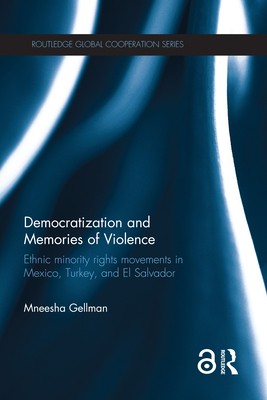
- We will send in 10–14 business days.
- Author: Mneesha Gellman
- Publisher: Routledge
- Year: 2016
- Pages: 226
- ISBN-10: 1138952680
- ISBN-13: 9781138952683
- Format: 16.3 x 23.4 x 1.8 cm, hardcover
- Language: English
- SAVE -10% with code: EXTRA
Reviews
Description
Ethnic minority communities make claims for cultural rights from states in different ways depending on how governments include them in policies and practices of accommodation or assimilation. However, institutional explanations don't tell the whole story, as individuals and communities also protest, using emotionally compelling narratives about past wrongs to justify their claims for new rights protections.
Democratization and Memories of Violence: Ethnic minority rights movements in Mexico, Turkey, and El Salvador examines how ethnic minority communities use memories of state and paramilitary violence to shame states into cooperating with minority cultural agendas such as the right to mother tongue education. Shaming and claiming is a social movement tactic that binds historic violence to contemporary citizenship. Combining theory with empirics, the book accounts for how democratization shapes citizen experiences of interest representation and how memorialization processes challenge state regimes of forgetting at local, state, and international levels. Democratization and Memories of Violence draws on six case studies in Mexico, Turkey, and El Salvador to show how memory-based narratives serve as emotionally salient leverage for marginalized communities to facilitate state consideration of minority rights agendas.
This book will be of interest to postgraduates and researchers in comparative politics, development studies, sociology, international studies, peace and conflict studies and area studies.
EXTRA 10 % discount with code: EXTRA
The promotion ends in 18d.16:13:19
The discount code is valid when purchasing from 10 €. Discounts do not stack.
- Author: Mneesha Gellman
- Publisher: Routledge
- Year: 2016
- Pages: 226
- ISBN-10: 1138952680
- ISBN-13: 9781138952683
- Format: 16.3 x 23.4 x 1.8 cm, hardcover
- Language: English English
Ethnic minority communities make claims for cultural rights from states in different ways depending on how governments include them in policies and practices of accommodation or assimilation. However, institutional explanations don't tell the whole story, as individuals and communities also protest, using emotionally compelling narratives about past wrongs to justify their claims for new rights protections.
Democratization and Memories of Violence: Ethnic minority rights movements in Mexico, Turkey, and El Salvador examines how ethnic minority communities use memories of state and paramilitary violence to shame states into cooperating with minority cultural agendas such as the right to mother tongue education. Shaming and claiming is a social movement tactic that binds historic violence to contemporary citizenship. Combining theory with empirics, the book accounts for how democratization shapes citizen experiences of interest representation and how memorialization processes challenge state regimes of forgetting at local, state, and international levels. Democratization and Memories of Violence draws on six case studies in Mexico, Turkey, and El Salvador to show how memory-based narratives serve as emotionally salient leverage for marginalized communities to facilitate state consideration of minority rights agendas.
This book will be of interest to postgraduates and researchers in comparative politics, development studies, sociology, international studies, peace and conflict studies and area studies.


Reviews